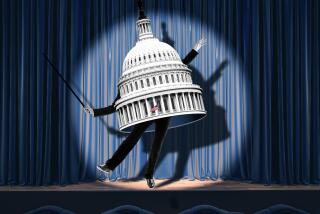Rohrabacher Ready for Art Support Fight
- Share via
WASHINGTON — The bitter battle over government sponsorship of controversial works of art will shift next week to the House of Representatives, where Rep. Dana Rohrabacher (R-Lomita) is leading a hard-fought campaign to ban taxpayer support for “obscene or indecent” artwork.
Crusading for a cause championed by conservative Sen. Jesse A. Helms (R-N.C.), Rohrabacher has developed a parliamentary strategy intended to stop the National Endowment for the Arts from subsidizing art that Rohrabacher characterizes as “trash.”
The issue is likely to come to a head Tuesday, when House leaders are expected to appoint representatives to a House-Senate conference committee that will hammer out a bill to finance the NEA in the fiscal year beginning Oct. 1.
The attempt to ban NEA funding of indecent or obscene projects puts Rohrabacher at the center of a movement that has incensed the art community nationwide. But it has drawn a strong show of support by conservative groups who objected to homosexual and sacrilegious themes in some projects supported by the NEA.
Several groups have particularly objected to an NEA-sponsored photograph depicting a crucifix immersed in a bottle of the artist’s urine and to an exhibit of photographs by the late artist Robert Mapplethorpe depicting homosexual acts.
“What we’re talking about here is sponsorship, not censorship,” Rohrabacher said in an interview Wednesday. “If artists want to do it (produce sexually explicit or sacrilegious work) on their own time, with their own dime, I’m not going to send out squads looking for them and have some sort of art police.
“But if they’re doing it with federal funds, I think it really should concern us.”
Rohrabacher plans to introduce a motion instructing House conferees to incorporate in the final version of the NEA funding bill a restrictive amendment that Helms successfully introduced in the Senate earlier this summer.
Although it is uncertain if the conferees would be legally bound by such a motion, authorities on both sides of the aisle agreed that they would be hard pressed to ignore it.
Rohrabacher, whose political background is Libertarian, previously had tried unsuccessfully to persuade the House to reject all funding for the NEA.
“I don’t believe that the government, in a time of severe deficit crisis, should be spending money on frivolous things like the arts in the first place,” he said. “However, if the government does spend the money, it seems to be only responsible that it set standards so that the money is wisely used.”
Approved on a voice vote in the Senate, the Helms amendment would bar funding of projects that “promote, disseminate or produce” material that is “indecent or obscene,” that denigrates “the objects or beliefs of the adherents of a particular religion or non-religion,” or that “debases, or reviles a person, group or class of citizens on the basis of race, creed, sex, handicap, age or national origin.”
The House had earlier approved an NEA funding bill that did not include the Helms language.
The Helms amendment has outraged national as well as local arts groups, prompting some to sponsor an “Art Emergency Day” that was observed last month in Los Angeles, New York and other cities.
One of the groups that is lobbying hard to defeat Rohrabacher is the Washington-based American Arts Alliance.
“Do you lose your First Amendment rights when you take federal money?” asked Anne Murphy, who heads the group.
The federal government, she said, “couldn’t say to kids getting . . . grants to go to (college) that you can only study things that are in the state’s interests.”
“I would never question Mr. Rohrabacher’s freedom to act on his own beliefs,” Murphy said. “We will be doing our very best to be sure that the House of Representatives is aware of the other side of the issue.”
In two “Dear Colleague” letters to members of the House, Rohrabacher has put his fellow representatives on notice that private conservative groups across the country will hold them accountable for their votes next week.
Among the conservative groups supporting Rohrabacher’s efforts is Coalitions for America, headed by Paul M. Weyrich. Weyrich, a well-known Washington figure, successfully campaigned against the nomination of former Texas Sen. John Tower to become secretary of defense on the grounds that Tower was not morally suited for the job.
The scenario that Rohrabacher and his staff expect to be played out next week reads this way:
Sometime Tuesday, the chairman of the House Appropriations Committee or its subcommittee on the Interior Department is expected to ask unanimous consent of the House to bring to the floor the Senate’s Interior Department appropriations bill.
That bill contains language to fund the NEA in the 1990 fiscal year as well as the Helms amendment.
Rohrabacher expects that a member of the Appropriations Committee will then rise to introduce a motion instructing the House conferees to take action on the bill short of including the Helms language.
If Rohrabacher can persuade a majority of the House to vote against cutting off debate on that motion, he will have an opportunity to introduce his own motion instructing the conferees to adopt the Helms language in the final bill.
Both the House and Senate would again have to approve the bill that emerges from the conference committee.
“If they (Rohrabacher and his staff) get as far as offering their own motion to instruct, I think it will pass,” said an aide to Helms, who asked not to be named.
However, a House staff member who is familiar with the appropriations process declined to predict the outcome. “It’s anybody’s guess,” he said.
More to Read
The biggest entertainment stories
Get our big stories about Hollywood, film, television, music, arts, culture and more right in your inbox as soon as they publish.
You may occasionally receive promotional content from the Los Angeles Times.










